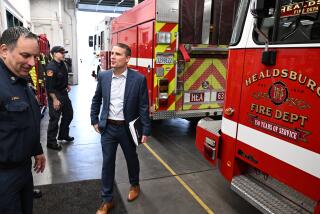Newton: The speaker speaks
John Pérez and I have been talking about the government and politics of California for 13 years. Some aspects of that conversation have changed: In our early conversations, he was the executive director of the United Food and Commercial Workers States’ Council; now, he’s the Speaker of the Assembly. Our first discussion was over bagels at a Silver Lake coffee shop. Last week, it was in the back room of the Pacific Dining Car, which Pérez says he appreciates for the privacy. A 28-year-old outsider when we met in 1998, he’s now in his 40s, and he’s at the center of what he once observed from a distance.
What hasn’t changed is Pérez’s immersion in the deep policy questions that confront his state. He’s a wonk of a particular type -- drawn not just to solutions but to the practical question of how to get things done, how to move votes and make deals. A big man who enjoys wielding power -- his conversation is peppered with observations about “my votes” and “keeping my caucus in line” -- he’s thoughtful but edgy, more Boss Tweed than ivory tower. It’s easy to see why he and Gov. Jerry Brown are said to get along famously.
The Legislature’s great challenge in the upcoming session, Pérez said, will be to continue chipping away at California’s structural deficit. According to Pérez, last year’s budget-cutting closed the gap between the state’s revenue and ongoing obligations down to about $5 billion to $6 billion, significant progress compared with the original $40-billion gap, but still a challenge. Moreover, since California continues to drag through a terrible economy and woeful unemployment, revenue is expected to lag again, perhaps widening this year’s shortfall to more than $10 billion.
What’s harder is that every year of cutting makes the next more challenging. The easy cuts have been made, and now legislators face difficult decisions about which things long considered essential should get the ax. As is the case in Washington, the budget shortfall also invites the question of whether reductions should be matched with tax increases. Republicans have vowed not to let that happen, and the state’s requirement for a two-thirds vote on tax increases gives them power disproportionate to their numbers.
Pérez, however, refuses to only consider one half of the budget.
“Every legislator has to be part of the solution,” he emphasized. If Republicans simply refuse to talk, they abdicate their reason for being elected. “It’s not easy,” he conceded, and it requires “significant engagement,” but walking away or pouting is no answer.
Are there Republicans who will negotiate? “There are some with whom you can have the rational conversation,” Pérez said.
Another piece of the budget picture, Pérez notes, is jobs. Higher employment in the state would automatically generate higher tax revenue. But the obstacles are formidable, as he conceded: “You can’t legislate the economy.”
Three years since the economy nose-dived in the closing months of President Bush’s administration, California still is struggling to produce a coherent response. Local governments compete against one another for retail outlets that produce sales taxes, another issue that Pérez has been talking about for more than a decade. The ports aren’t being upgraded fast enough while rivals in Mexico, Canada and other parts of the United States are positioning themselves to divert traffic from California once the Panama Canal is modernized. Pérez wants the Legislature to devote itself this year to improving infrastructure -- creating jobs along the way and readying the economy for the next turn of the wheel. But that, too, is difficult in a time of deficits.
When we first talked 13 years ago, Pérez had an upstart’s take on local leaders; he was incisive, for instance, about analyzing the strengths and weaknesses of then-Mayor Richard Riordan. Now that he’s in the Legislature, though, he’s no longer as critical -- or at least not as frank. I asked him how he thinks the public perceives him and his colleagues.
“Most people appreciate that we’re trying hard,” he answered, cautiously adding that the Legislature’s approval ratings have inched up a bit in recent years.
He’s right on one point: A Field Poll last month concluded that the percentage of Californians who approve of the Legislature’s work has doubled in the last year. The trouble for Pérez and his colleagues is that it’s doubled from 10% to 20%.
More to Read
A cure for the common opinion
Get thought-provoking perspectives with our weekly newsletter.
You may occasionally receive promotional content from the Los Angeles Times.







